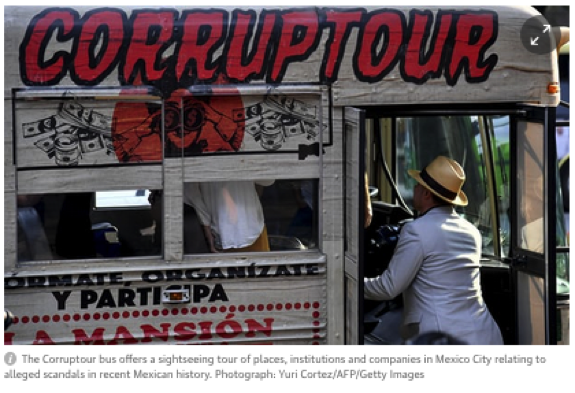
Bribes for public services rife in Latin America and the Caribbean, survey finds
October 10, 2017 - The Guardian
Karen McVeigh @karenmcveigh1
One in three people across the region paid a bribe in the past year to police, health services or schools, says Transparency International
One in three people using public services in Latin America and the Caribbean report having to pay a bribe over the last year, according to a survey.
A report by Transparency International found Mexico has the highest bribery rate in the region, with one of every two people reporting paying bribes, followed by the Dominican Republic and Peru.
Overall, the police were the least trusted public institution, with 47% of those questioned across 20 countries saying most or all officers were corrupt. In crisis-hit Venezuela, which has seen waves of anti-government protests over the last year, 73% of people surveyed saw the police as corrupt.
Schools, hospitals and ID documentation services were especially prone to bribery in Mexico, researchers found.
The report documents "worrying trends" in Latin America and the Caribbean of weakening government structures and the erosion of human rights.
Despite public protests against corruption in Venezuela, Brazil, Guatemala and the Dominican Republic over the past year, almost two-thirds (62%) of those surveyed said corruption had increased.
On average, more than half of the 22,000 people surveyed said their government performed poorly. In Venezuela and Peru, more than 70% of those questioned gave a negative verdict.
José Ugaz, chair of Transparency International, said: "The people of Latin America and the Caribbean are being let down by their governments, their political class and their private sector leaders. Operation Car Wash, which has made a tremendous impact in the region, demonstrates that corruption is far too prevalent. Bribery represents a means for enrichment of the few, and a significant barrier to accessing key public services, particularly for the most vulnerable in society."
Operation Lava Jato (car wash) is an ongoing criminal investigation that has exposed systemic corruption among Brazil's political and business elite. It began as an inquiry into the state-owned oil company, Petrobras, where executives allegedly accepted bribes in exchange for awarding contracts for construction firms.
The report found that while whistleblowing is culturally acceptable across the region, 28% of people who reported corruption suffered from retaliation. This could explain, it said, why only 9% of people come forward to report bribes.
Transparency International called for governments to strengthen their judicial systems, fight police corruption and do more to support their own citizens who are willing to report it.
"The past year has seen governments across the region rocked by corruption scandals, and Venezuela descend deeper and deeper into crisis," said Ugaz. "But this report shows that citizens' demands for accountability and transparency are not being met by their leaders."